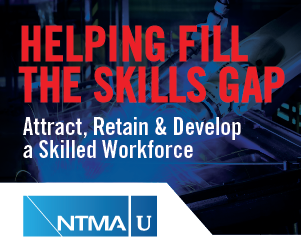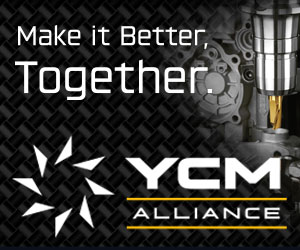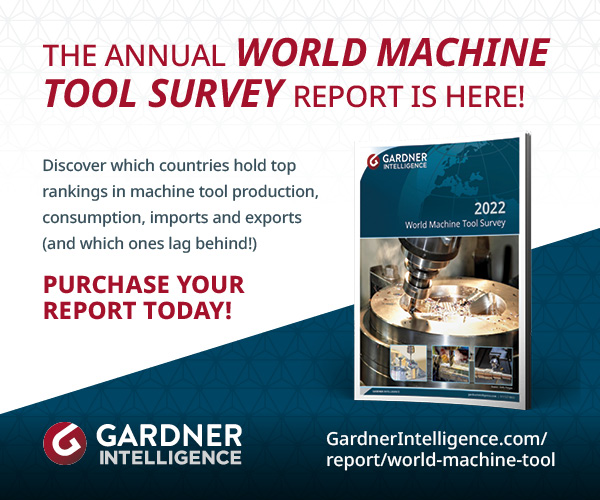A Peek Inside TMTS
Sponsored ContentFor the Taiwan International Machine Tool Show (TMTS) this year, we spoke to representatives from several companies who discussed how they approach sustainability and smart manufacturing — the themes of this year’s show.
Share
The Taiwan International Machine Tool Show took place March 27-31 this year, with many manufacturers participating. The show saw a range of OEMs that produce machine tools, as well as manufacturers of vital machine tool components. We sat down with representatives from six of these companies.
Patrick Chen — Chairman of the Taiwan Machine Tool and Accessory Builders Association (TMBA) and GM of Yeong Chin Machinery (YCM)
Patrick Chen of YCM poses in front of the company’s “Green Smart Machine Alliance” display at TMTS 2024. YCM is a machine tool manufacturer that produces a variety of horizontal and vertical machining centers, as well as lathes.
Source: All images provided by J&M Media
What place does five-axis machining have in YCM’s offerings?
The UV650 five-axis VMC provides excellent cutting performance and high accuracy for simultaneous five-axis applications with one setup. It is designed to reduce part handling, setup and overall lead time, while improving part quality, precision and surface finish for complex shapes and contours.
The NFX 400A five-axis VMC is designed for small, complex parts — mainly for aerospace, automotive, medical and die-mold applications. It enables manufacturers to reduce setup and lead time while increasing machining quality and improving the precision of complex processes.
What is YCM’s approach to smart manufacturing?
By leveraging smart technologies, companies can optimize equipment uptime, minimizing interruptions in critical production processes. Notably, YCM has seamlessly integrated self-developed temperature sensors and accelerometers into the spindle, enabling efficient monitoring and collection of spindle vibration data. The extensive data collection facilitates the prediction of component life and potential failure.
As Chairman of the TMBA, what do you think American manufacturers should know about Taiwanese OEMs?
We have a complete supply chain, and there is strong collaboration between machine manufacturers and component manufacturers, so Taiwan's machine tool industry can quickly adapt to customer demands, developing customized machines. In addition, the introduction of quality standards, design specifications and excellent after-sales service can enhance customer satisfaction. This has enabled Taiwan's machine tool industry to consistently maintain its leading position in global export rankings and has made the United States market the second-largest export destination for Taiwan's machine tool industry.
Winston Tai — Vice Chairman of the TMBA and GM of Taiwan Takisawa
Winston Tai of Taiwan Takisawa poses next to the company’s UX 2000 mill-turn machine. Matching the theme of the show, many of the company’s advanced machine tools use smart technology to reduce energy consumption while maintaining consistent quality.
What machining solutions did Taiwan Takisawa have on display at TMTS 2024? What makes these solutions a good focal point for Taiwan Takisawa?
The EX-2000YS is a high-precision, low-energy mill-turn machine equipped with our energy-saving mode. It utilizes variable-frequency hydraulic systems to effectively regulate hydraulic pump output, reducing lubrication usage by 20% and energy consumption by 15%. The main spindle unit replaces oil-based cooling with low-energy air cooling, reducing overall energy consumption by over 40%.
It can integrate virtual and real-time intelligent monitoring functions such as temperature-rise compensation, collision prevention and simulated cutting, providing users with a more intelligent and eco-friendly machining experience. Furthermore, the digital-twin function of the controller and the SWM system interface make data on energy consumption, utilization-rate, motor temperature, spindle load, production history and equipment alarm history readily available.
Additionally, we brought a simulated automated factory production line into the exhibition venue, where we paired intelligent machinery with automation systems. Equipped with the SWM system, it achieved high-speed, high-volume production with the flexibility to produce diverse products.
As Vice Chairman of the TMBA, what relationship do you hope to foster between Taiwanese equipment manufacturers and American part makers?
The software systems developed in the United States lead globally and are vital for Taiwan's machine tool digital transformation. This includes PDM/PLM, CAD/CAM and digital twins, which can accelerate Taiwanese machine tool factories in achieving digital transformation.
Cheng Chen — Vice Chairman of the TMBA and Chairman of TPI Bearings
Cheng Chen of TPI Bearings poses next to one of the company’s displays at TMTS 2024. During the show, TPI emphasized the ability of smart manufacturing tools to improve spindle lifespans.
How does TPI incorporate smart manufacturing into its processes?
TPI Smart Manufacturing uses data to transform experience into a database, and we use lean production to reduce waste. By continuously improving, we stabilize equipment, streamline processes, and ensure quality management across our entire product range.
What are the latest developments in the Bearing Health Diagnosis System?
Initially, we confirmed the accuracy of the algorithm and observed initial results in the lab, particularly concerning early signs of bearing wear that can be identified. To get field performance, we deployed the bearing health diagnosis system on the TPI manufacturing line for practical testing, monitoring the condition of the grinding spindle bearings. Our aim is to achieve positive outcomes with the in-factory production equipment, enhancing the reliability of the diagnosis system and minimizing unforeseen damage to production equipment.
How can users rely on smart manufacturing to improve spindle lifespans?
By using sensors to monitor spindle status, users can gather data for adaptive control of processing parameters. This approach not only optimizes quality but also allows the spindle to operate under ideal conditions, significantly expanding its lifespan.
As Vice Chairman of the TMBA, what role do you see for Taiwanese machine- and accessory-builders on the international market?
Taiwan's machine tool industry has excellent customization capabilities. Over recent years, the industry has aligned with international standards, including carbon-reduction regulations, and has embraced modular design to swiftly adapt to market dynamics, positioning itself as a flexible manufacturing partner within the global supply chain.
Simon Liao — Deputy GM of Hiwin
Simon Liao of HIWIN stands near a display at the company’s booth at TMST 2024. HIWIN manufactures a range of motion-control products, including the Intelligent 4.0 Ball Screw, which provides feedback on vibration and temperature.
What does smart manufacturing mean to HIWIN?
HIWIN’s motion-control products and electromechanical integration Total
Solution have become key drivers for precision machinery upgrading. This includes the Intelligent 4.0 Ballscrew (i4.0BS®) for high-end machine tools and direct-drive Torque Motor Rotary Table for four-axis and five-axis machines.
How does the i4.0BS help users improve their production process?
HIWIN’s Intelligent Ball Screw i4.0BS provides various intelligent functions
through a vibration-temperature hybrid sensor and edge-computing module with built-in algorithms, including life prognosis, temperature and vibration monitoring, intelligent lubrication, intelligent warm-up, and data acquisition — this combination allows users to quickly implement digital transformations and upgrade intelligent machinery.
How does HIWIN approach green manufacturing and the circular
economy?
HIWIN has been working towards developing green products and implementing green manufacturing to achieve a circular economy and reduce carbon emissions. For example, the i4.0BS enables customers to monitor machine conditions and avoid unexpected shutdowns, thereby increasing production efficiency, and the smart lubrication function only enables lubrication when the machine is in operation, reducing oil usage and carbon emissions.
How does HIWIN assist its customers in planning production lines to be more sustainable?
We continue to upgrade our smart components, providing simple, safe, energy-saving designs. The i4.0BS offers real-time remote monitoring of machine conditions to avoid unexpected downtime, optimize machine maintenance cycles and attain energy savings to meet sustainability goals.
Adam Hsu — Product Manager at Syntec
Adam Hsu of Syntec poses next to the company’s TMTS 2024 display. The company manufactures customizable machine tool controllers that use energy-saving and smart technology to make machining processes more efficient and consistent.
What niche does Syntec fill in the controller market?
In its commitment to deliver more comprehensive solutions, Syntec has expanded its focus beyond single controllers. In addition to developing controllers of various specifications, we have also in recent years developed a complete set of servo system solutions — including drivers, motors, encoders and more. This enables users to customize product features to meet their specific needs.
How do you approach green manufacturing and the circular economy?
We have multiple energy-saving solutions, such as functions that reduce the need for coolants and run machines more efficiently. Additionally, making energy-consumption data more visible empowers users to reduce energy usage on their end.
Do you see a place for yourself in U.S. shops that already use other controllers?
We find that the ease of use for our control makes it easier to integrate into machine shops that already use our competitors, and the customizability of our control makes it particularly useful.
What does smart machining mean to Syntec?
We have several kinds of products that incorporate smart technology, including tool-breakage detection and thermal monitoring for the spindle, and we include automatic stopping to prevent damage to machine tool or parts.
Eric Loo — Director of Overseas Sales & Marketing at WELE Mechatronic
Eric Loo of WELE Mechatronic stands next to the company’s VTC1612CW, a compact vertical turning center capable of turning parts as long as 1200 millimeters
What machine tools did WELE display at TMTS?
WELE showed the VTC1612CW and HBM1212-110 at this IMTS. We focus on general-purpose machine shops who are seeking small machines with higher machining capacity in a more compact frame.
How does WELE approach green manufacturing and the circular economy?
We use equipment that consumes less energy during production and have reduced the number of cast iron parts. We have also replaced machine components with power-saving hydraulics to help customers reduce electricity costs.
What does smart manufacturing mean to WELE?
Smart manufacturing makes things more efficient, enables users to predict when equipment needs fixing, gives useful information from data and cuts down on how much it costs to run a shop. WELE’s smart HMI iSmarTune, for example, enables customers to troubleshoot most issues without waiting for service engineers. Additionally, the adaptive control can keep the chip load constant to protect tooling and spindle life.
What benefits do WELE’s high-speed machining solutions provide?
High-speed machining solutions reduce costs, increase productivity and improved quality control. High-speed machining is also providing benefits in specific use-cases. For example, in semiconductor machining, some small parts need high-speed drilling, so WELE has developed a high-speed drilling machine capable of 3-g acceleration and equipped with a self-developed auto-aligning algorithm, increasing part accuracy and improving performance.
What industries does WELE machines see the most use in?
Oil and gas, automotive, die-mold, wind power, aerospace, semiconductor, electronics and machine manufacturing industries are WELE’s most popular end markets.






















.jpg)











